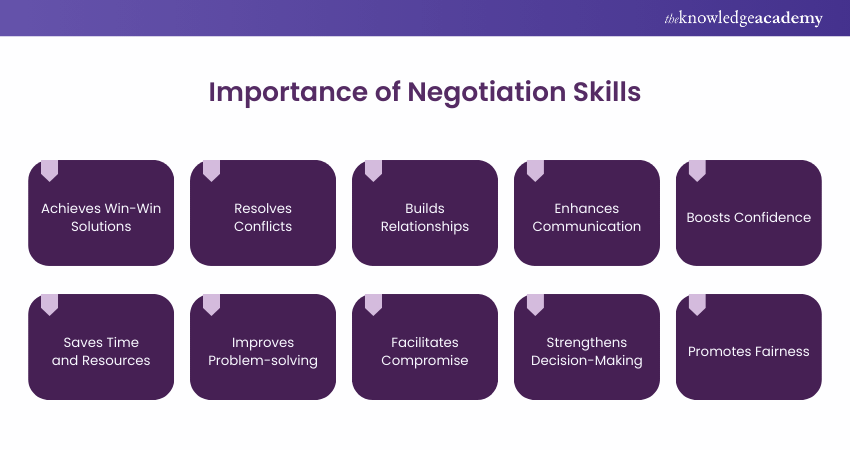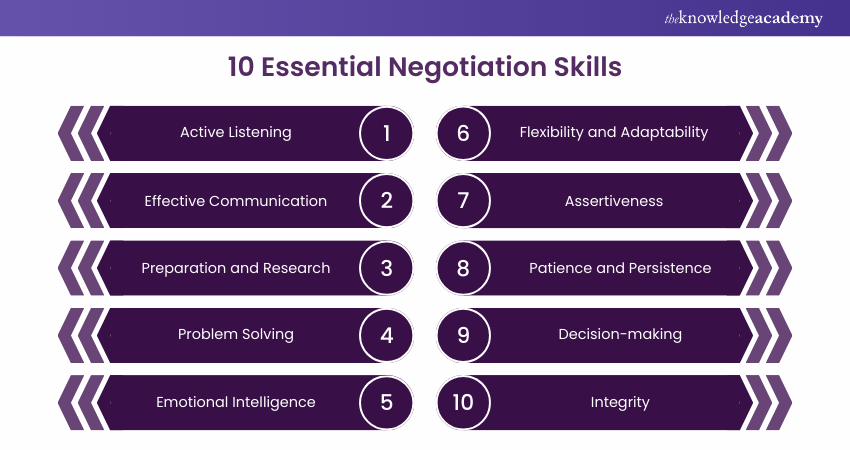We may not have the course you’re looking for. If you enquire or give us a call on + 1-866 272 8822 and speak to our training experts, we may still be able to help with your training requirements.
We ensure quality, budget-alignment, and timely delivery by our expert instructors.

Negotiation Skills are vital in various aspects of life, ranging from business deals and career advancements to personal relationships and everyday interactions. These skills can empower individuals to achieve mutually beneficial outcomes, resolve conflicts, and foster positive connections.
By mastering these skills, you can gain valuable tools that can help you in various scenarios, such as salary negotiations, contract agreements, conflict resolution, and even personal decision-making processes. But the question is: What are Negotiation Skills and how can they be beneficial? Explore this blog to understand Negotiation Skills, their importance and how to improve them to succeed in your career.
Table of Contents
1) What are Negotiation Skills?
2) Importance of Negotiation Skills
3) 10 Essential Negotiation Skills
4) Steps to Improve Your Negotiation Skills
5) Conclusion
What are Negotiation Skills?
Negotiation skills are the abilities that enable individuals to engage in discussions and resolve conflicts. The main goal of negotiation is to find a middle ground that all involved parties can agree on. These skills are a combination of soft skills, including analysis, planning, convincing, collaborating, and effective communication.
Importance of Negotiation Skills
Negotiation Skills are important for achieving favourable outcomes in both personal and professional interactions. Some of the required skills are:

a) Achieves Win-Win Solutions: Negotiation helps both sides get what they need. It creates outcomes where everyone benefits.
b) Resolves Conflicts: It helps settle disagreements peacefully. This reduces tension and finds common ground.
c) Builds Relationships: Good negotiation strengthens personal and professional bonds. It fosters trust and cooperation.
d) Enhances Communication: It improves how people talk and understand each other. Clear Communication Skills leads to better outcomes.
e) Boosts Confidence: Negotiating successfully builds self-assurance. This confidence helps in future discussions and decisions.
f) Saves Time and Resources: Effective negotiation prevents long disputes. It avoids unnecessary costs and wasted time.
g) Improves Problem-solving: It encourages finding creative solutions. Negotiation helps address issues effectively.
h) Facilitates Compromise: It helps find a middle ground that satisfies everyone. Compromise makes sure all parties are happy.
i) Strengthens Decision-Making: It helps make informed choices. Better decisions lead to better results.
j) Promotes Fairness: It ensures outcomes are fair for all involved. Fair negotiation builds trust and respect.
Learn how culture influences your perspective with our Cross-Cultural Communications Training – join today!
10 Essential Negotiation Skills
Mastering Negotiation Skills is crucial for success in various aspects of life. This section covers 10 essential Negotiation Skills that will help you handle discussions effectively and achieve mutually beneficial outcomes, while understanding the various Factors Affecting Negotiation that can influence the process. Let's explore these key skills.

1) Active Listening
Active listening is one of the fundamental Negotiation Skills that involves fully engaging with the speaker and understanding their perspective. It requires giving undivided attention, observing non-verbal cues, and empathetically comprehending the underlying message. By actively listening, Negotiators can uncover important information, identify interests, and establish rapport with the other party. This Negotiation Skills allows them to respond effectively and tailor your proposals to meet their specific needs.
2) Effective Communication
Effective communication is paramount in negotiations. It involves expressing thoughts, ideas, and proposals clearly and concisely. Clear communication minimises misunderstandings and fosters trust and understanding between parties. By articulating their perspectives, actively listening, and using appropriate language, Negotiators can convey their ideas persuasively and promote mutual comprehension.
3) Preparation and Research
Preparation and research are key components of successful negotiations. Understanding the negotiation context, the other party’s interests and relevant market conditions empowers the Negotiators to make informed decisions. By conducting comprehensive research, gathering pertinent information, and anticipating potential challenges, you can develop effective Negotiation Techniques and leverage your knowledge to achieve favourable outcomes.
4) Problem Solving
Effective Negotiators possess strong problem-solving skills, enabling them to identify creative and mutually beneficial solutions. Problem-solving involves analysing complex issues, thinking critically, and exploring various alternatives. By adopting a collaborative approach and seeking innovative solutions, Negotiators can overcome obstacles and find resolutions that meet the needs of all parties.
5) Emotional Intelligence
Emotional intelligence plays a vital role in negotiations. It refers to the ability to recognise, understand, and manage emotions—both in oneself and others. Negotiators can navigate sensitive situations with greater sensitivity and effectiveness by being aware of emotions and employing empathy. Emotional intelligence facilitates building rapport, diffusing conflicts, and finding common ground.
Gain real-world skills to communicate your thoughts effectively - register for our Communication Skills Course.
6) Flexibility and Adaptability
Flexibility and adaptability are essential Negotiation Skills, particularly in dynamic and ever-changing environments. Being open to different perspectives, ideas, and approaches allows Negotiators to adjust their strategies based on new information and changing circumstances. By remaining flexible, Negotiators can find innovative solutions and reach agreements that accommodate the evolving needs and priorities of all parties involved.
7) Assertiveness
Assertiveness is the ability to express thoughts, needs, and boundaries confidently while respecting the rights and opinions of others. It allows Negotiators to advocate for their interests effectively without being aggressive or overly submissive. Assertiveness promotes mutual respect, encourages constructive dialogue, and facilitates the negotiation process.
8) Patience and Persistence
Negotiations can often be time-consuming and challenging. Patience and persistence are vital qualities for Negotiators. Patience allows for thoroughly exploring options, understanding different perspectives, and promoting collaboration. Persistence helps Negotiators navigate setbacks, overcome obstacles, and work towards achieving mutually beneficial outcomes.
9) Decision-making
Good Negotiators can make choices quickly and don’t get stuck overthinking. If you take too long to decide, you might end up just agreeing to anything to end the stress. Being clear and firm helps keep things moving smoothly. Quick decisions also show confidence and decisiveness. Effective decision-making ensures that negotiations stay on track and reach a timely conclusion.
10) Integrity
Integrity in negotiation also means being consistent and reliable. It’s about making sure you’re someone others can count on to be fair and to stick to the rules. When you’re known for your integrity, people are more likely to trust you and feel comfortable making deals with you. It’s not just about the current negotiation; it’s about building a reputation that will last and benefit you in the long run.
Want to stand out in your next interview? Master the Negotiation Skills Interview Questions and showcase your expertise in handling complex situations.
Steps to Improve Your Negotiation Skills
If you're ready to improve your Negotiation capabilities, consider these recommendations:
a) Practice Regularly
Like any skill, negotiation improves with practice. If real-life negotiation opportunities are short, you can practise role-play sessions with a friend or mentor. Create diverse scenarios that require different negotiation approaches to improve your comfort and versatility.
b) Cultivate Confidence
Confidence plays a pivotal role in successful negotiations. When you are self-assured, it often instils trust in the other party and makes them more inclined to agree to your terms. On the other hand, a lack of confidence can convey unpreparedness and uncertainty.
c) Define Clear Objectives
Enter negotiations with a well-defined understanding of your objectives, build an appropriate approach to achieve them, and understand the limits within which you're willing to compromise. This clarity provides you with a roadmap toward your goals and allows you to respond effectively to counteroffers.
d) Initiate the discussion
You can often seize control of the Negotiation by making the initial offer. By setting the baseline, you can establish the starting point for the discussion and direct the bargaining process from a position of your choice.
e) Learn from experience
After each Negotiation, whether it ends successfully or not, you can take time to assess your performance. Reflect on what went well and areas that require improvement. Recognising your weaknesses helps you to target them for further improvement through additional Negotiation training.
Learn to articulate ideas clearly with our Effective Communication Skills Course – join today!
Conclusion
Negotiation Skills are indispensable assets that empower individuals to navigate various situations and achieve desirable outcomes. Individuals can enhance their decision-making, build rapport, and resolve conflicts amicably by cultivating these skills. So, seize the opportunity and unlock a world of possibilities where effective communication, collaboration, and compromise pave the way to achieving your goals.
Learn how to negotiate successfully with our Negotiation Skills Course - join today!
Frequently Asked Questions
How do Cultural Differences Impact Negotiation Dynamics, and how can They be Navigated?

Cultural differences impact negotiation dynamics through varying communication styles, attitudes towards conflict, decision-making practices, and value systems. Navigating these requires cultural sensitivity, flexibility, and open-mindedness.
How can Negotiation Skills be Honed for Virtual or Remote Communication Scenarios?

Honing Negotiation Skills for virtual scenarios involves mastering digital communication tools and enhancing clarity and conciseness in written and verbal communication. It also includes understanding the nuances of non-verbal cues through video, practising active listening, and being adaptable to technology glitches.
What are the Other Resources and Offers Provided by The Knowledge Academy?

The Knowledge Academy takes global learning to new heights, offering over 3,000 online courses across 490+ locations in 190+ countries. This expansive reach ensures accessibility and convenience for learners worldwide.
Alongside our diverse Online Course Catalogue, encompassing 19 major categories, we go the extra mile by providing a plethora of free educational Online Resources like News updates, Blogs, videos, webinars, and interview questions. Tailoring learning experiences further, professionals can maximise value with customisable Course Bundles of TKA.
What is Knowledge Pass, and how Does it Work?

The Knowledge Academy’s Knowledge Pass, a prepaid voucher, adds another layer of flexibility, allowing course bookings over a 12-month period. Join us on a journey where education knows no bounds.
What are Related Courses and Blogs Provided by The Knowledge Academy?

The Knowledge Academy offers various Communication skills Courses including Assertiveness Skills Training, Negotiation Skills Training and Effective Communication Skills Training. These courses cater to different skill levels, providing comprehensive insights into Types of Negotiation.
Our Business skills blogs cover a range of topics related to communication skills along with negotiation techniques and examples, offering valuable resources, best practices, and industry insights. Whether you are a beginner or looking to advance your Communication skills, The Knowledge Academy's diverse courses and informative blogs have you covered.
Upcoming Business Skills Resources Batches & Dates
Date
 Public Speaking Course
Public Speaking Course
Fri 16th May 2025
Fri 11th Jul 2025
Fri 19th Sep 2025
Fri 21st Nov 2025






 Top Rated Course
Top Rated Course



 If you wish to make any changes to your course, please
If you wish to make any changes to your course, please


